Coffee Grounds In The Garbage Disposal
It’s a surprisingly contentious question: can you safely put coffee grounds through the grinder in your sink drain?
There’s an old wive’s tale that says that as coffee grounds go down the drain, they help to scour the pipes. But if you ask a plumber, it’s not a great idea–even if you’re running the disposal first.
While a lot of people manage to get rid of their used coffee grounds by rinsing them down the drain, there are several reasons why the coffee grounds garbage disposal combination is a bad one.

Coffee Grounds In The Garbage Disposal = Bad Idea
Lots of people think that garbage disposals can handle anything
In fact, when various consumer advocacy groups test in-sink disposals, the groups really put them through their paces: Consumer Reports uses beef rib bones, and manufacturers tend to use small blocks of wood and similar materials.
So how could coffee grounds be a problem?
Coffee Will Clog The System
There are many reasons, but it mostly comes down to the mechanisms in a garbage disposal and the qualities of coffee beans.
Used coffee grounds can clog the system because they’re too small for the shredding equipment in the sink grinder to really work on.
So over time, the grounds build up, eventually leading to backups in the toilet and even the shower.
There are some ways that you can mitigate the situation by flushing the system regularly with water to wash away the built-up grounds.
However, plumbers don’t recommend even this because it’s hard to make sure that you’re getting rid of everything–the finer grounds can get into the hardest-to-reach places inside the machine in your sink and drain, no matter how much water you use.
It’s best all-around just to avoid putting your coffee grounds through the sink dispose-all.
While it’s possible to mitigate the issue of the powdered coffee beans building up inside and clogging things up, it’s not easy to ensure, and even with the best efforts, you can still end up with clogs in your dispose-all and requiring expensive repairs.
Even worse: backups in the shower with gross wastewater.
To avoid gumming up the works in your trash grinder, it’s best not to try using it to process your used coffee grounds.
If you do have to occasionally make coffee grounds go down the drain, make sure yo use lots of water to rinse it as thoroughly as possible, but don’t make it a habit.
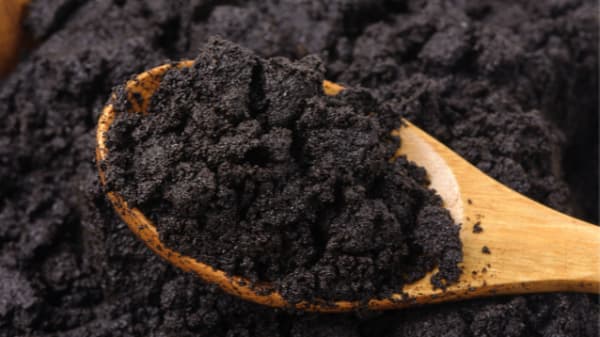
Can Coffee Grounds Go Down The Sink Or Drain?
So if you don’t have a disposal, is it any safer to wash your coffee grounds down the drain?
Unfortunately, no.
While old wives’ tales suggest that coffee grounds can help scour your pipes from the inside, they just aren’t hard enough or abrasive enough to properly do the job.
The fact is that coffee grounds can clog your drain.
How is that? Well, the pipes connecting to your drains aren’t perfectly smooth, and a lot of things can build up along interior walls below the sink and far away from the drain over time.
Soap residue, oils, and other materials tend to accumulate in layers slowly, and being sticky, they can trap dirt and other debris.
Coffee grounds are just small enough to get stuck in the muck, leading to thicker sludge in the wastewater and a more challenging clog to defeat.
Any plumber will tell you that the worst things you can put down your kitchen sink drain are butter or other fats that are solid at room temperature.
A close runner-up is coffee grounds. Even if you rinse with hot water afterward, that really just pushes the potential buildup further down in the piping.
It’s a lot harder to do the dishes if water comes up from the drain system and your sink doesn’t drain.
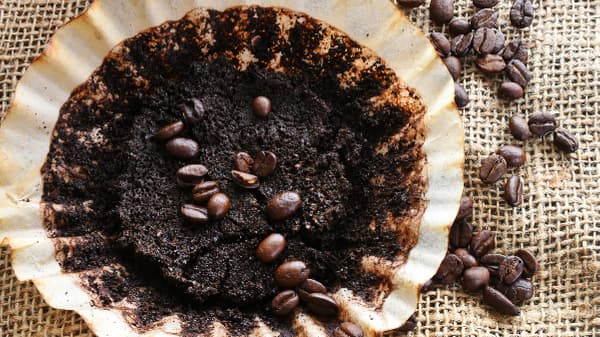
Grounds Stick Together
Ground coffee beans are good at clumping together, especially when they’re wet.
Combine that with a sticky surface along the inside of your pipes, and putting coffee grounds down the drain becomes a recipe for a pricey visit from a plumber.
It is possible to slow down the process by regularly pouring hot water with distilled vinegar added to it down the drain.
This helps to break up the oil and fats that the ground coffee sticks to and combine with to form the sludge that clogs your drain and lines.
But this doesn’t prevent it completely, and it doesn’t prevent clogs from forming deeper down in the plumbing.
Of course, sometimes we’re in a rush, and the kitchen sink is the easiest place to rinse out a portafilter or a metal drip coffee filter.
But it’s definitely not something to make a habit of for the sake of your plumbing system and your drain.
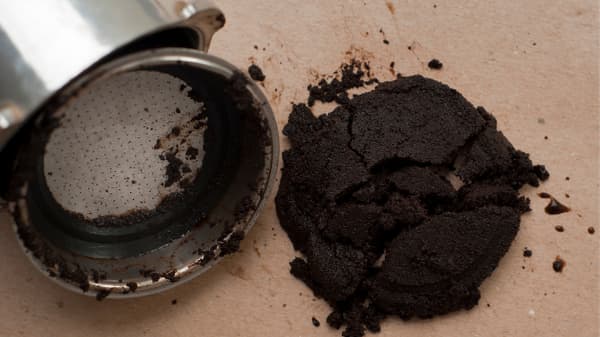
Coffee Grounds In Septic Tanks
What if you aren’t hooked up to city water and instead have a septic tank to take care of your drainage system needs?
It’s still not a great idea to put used coffee grounds down the drain.
The issues are different, and the methods you can use to mitigate the risks involved are a little different too, but overall, it can lead to headaches you don’t want in your life.
The biggest issue that any septic tank owner can tell you about their system is that things just don’t dissolve in the tank.
While some types of toilet paper are made to break down more, and there are enzymes recommended for speeding the process up, those products won’t dissolve used coffee that ends up in the tank.
Your Brews Grounds Don’t Dissolve
Anything that won’t dissolve in the septic tank can form solids.
That’s bad news over the long term and short term alike: the solids make it harder to empty out the tank, and they grow larger over time until the tank has to be directly opened or even replaced.
These kinds of interventions are costly and not worth the convenience of putting grounds into the drain.
Just like with other drainage systems, grease can accumulate in a septic tank. Grease is incredibly sticky stuff, and used coffee grounds are great at sticking.
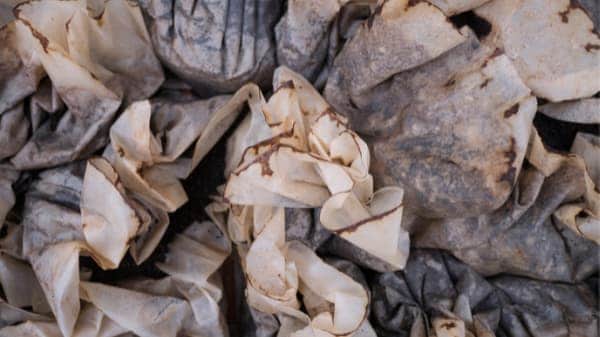
Since water doesn’t break coffee beans down on its own very effectively, it doesn’t matter how long it hangs out, and in fact, the longer your coffee grounds stay around, the more chance there is for them to form clogs.
Whether you flush your used coffee grounds down the toilet or through your kitchen sink drains, it can lead to big problems for your septic tank.
You can somewhat mitigate this problem by having your tank emptied more often because that will help take the coffee grounds out before they get a chance to form larger solids.
How often you’ll need to do that to prevent the more significant problems that can arise will depend on how much coffee you drink and the size of your tank.
In the long run, though, it’s just better not to risk it.
While you can mitigate the problem to a degree, there’s always a risk of missing a clog forming that will lead to a bigger repair or even the need to replace your tank when the coffee grounds gunk up the works.
There are a lot of options available for getting rid of your used coffee beans, so why do something risky?
How To Dispose Of Coffee Grounds
If you want to protect your drains, it’s essential to dispose of your coffee grounds without getting your sink or toilet involved.
There are a lot of different methods to get rid of your coffee grounds, ranging from the most basic to some more advanced options that can actually bring benefits.
The easiest method of disposing of your coffee grounds is just to throw them in the trash can.
And relax, used coffee grounds certainly qualify as trash. It’s a straightforward thing just to drop them in the trash bin too.
Compost For The Win
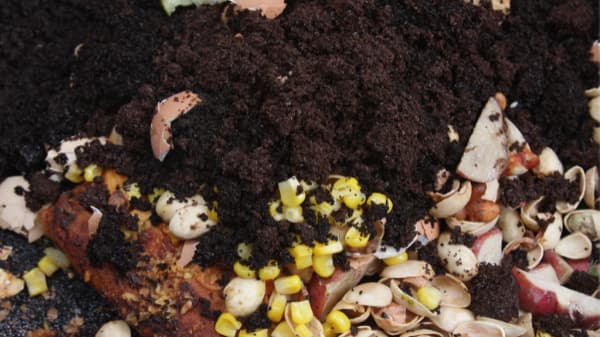
But if you don’t want your grounds to go to waste, even after you’ve already used them, you can also compost them.
Several municipalities offer community compost pick-up services if you don’t have a garden to enrich with the organic fertilizer. If you have your own growing projects, coffee grounds are an excellent material.
There are a lot of ways you can put your coffee grounds to use, recycling them into different end products.
If you have a compost bin, you can collect the grounds from a permanent filter brewing system and just toss them in. If you use paper filters, these are also compostable–and unbleached paper filters break down incredibly well.
Other Uses Exist Too
You can also reuse coffee grounds for other applications: they make a pretty good face scrub, though, of course, you’ll want to use a bowl or some other receptacle to rinse into in order to avoid allowing too much of the used grounds go down the drain.
Coffee grounds are also a decent tool for repelling some pests and insects.
If you do have a garden, your used grounds don’t just make good compost material: they’re a good additive for soil mixes for starting seeds and being acidic, you can use them to help correct any pH issues your soil might have.
They are also a big favorite of worms while being a major deterrent for ants, snails, and slugs.
All in all, there are way better methods of disposing of your coffee grounds than having the coffee grounds go down the drain.
By reusing them, you don’t just get more use out of your coffee beans, you also avoid expensive problems. And at the very easiest, it’s much better to put them in the trash than in the sink.
Related reads: reusing coffee grounds, what to do with old coffee.
Wrapping Up
All in all, there are too many other options available to justify making coffee grounds go down the drain.
Whether you try and pulverize them in the sink disposal, whether you own a septic tank or are on city water, the grounds can cause clogs, gunk up your machinery, and cause all kinds of trouble when they mingle with grease and oil.
Putting your coffee grounds into your garbage disposal can clog up the mechanisms that make it work.
It can be tempting to wash them down the kitchen sink, and we’ve even heard of some coffee lovers flushing grounds down the toilet or rinsing them down the shower drain, but those are all bad options.
All of those choices risk your drainage system and expensive repair bills.
If you want to dispose of your coffee grounds safely, you can compost them, add them to your soil, and otherwise recycle them.

